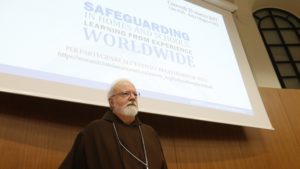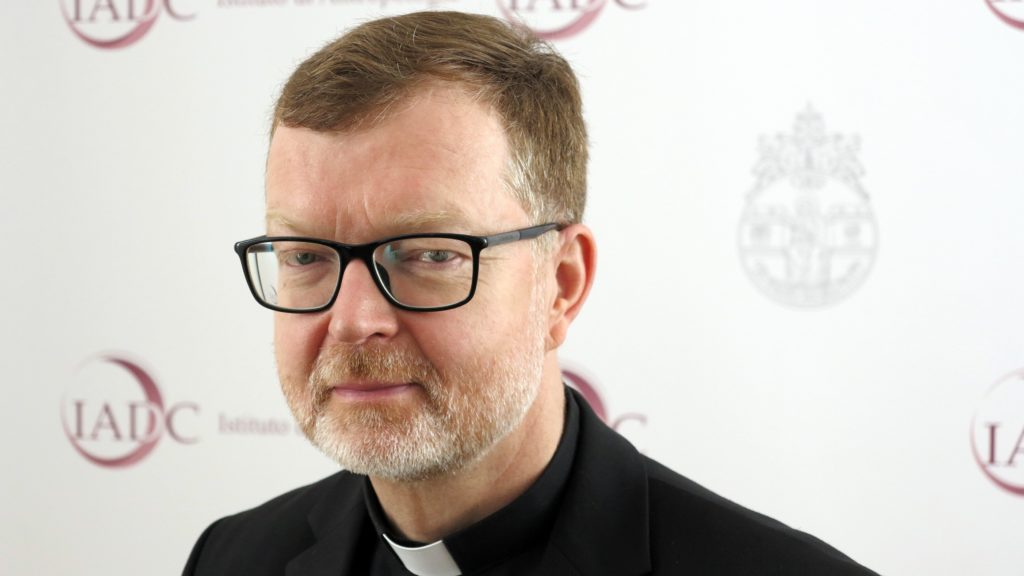Cardinal Seán P. O'Malley of Boston, president of the Pontifical Commission for the Protection of Minors, expressed his surprise, disappointment and disagreement with statements challenging the commission's effectiveness made by a prominent safeguarding expert who resigned from the advisory body.
However, "the commission has a plenary meeting scheduled in the next few weeks during which we can address these and other matters more fully as a group," the cardinal said in an updated statement March 30.

Jesuit Father Hans Zollner, a leading expert in the field and member of the commission since it was founded in 2014, stepped down in mid-March but gave the reasons for his departure in a public statement March 29, saying it was due to urgent "structural and practical issues that led me to disassociate myself" from the papal commission.
Father Zollner's criticisms came just a few hours after his resignation was made public in a written statement by Cardinal O'Malley.
“The commission has been informed that Father Hans Zollner, S.J., has asked to be relieved of his duties as a member," the cardinal wrote March 29, saying the priest "told me that he came to this decision after reflecting on his recent appointment as consultant for safeguarding to the Diocese of Rome."
Cardinal Angelo De Donatis, papal vicar for Rome, had announced March 3 that he appointed Father Zollner to be a consultant for the diocese's new office dedicated to safeguarding minors and vulnerable people. The priest is also director of the Institute of Anthropology: Interdisciplinary Studies on Human Dignity and Care at Rome's Pontifical Gregorian University.
"In light of this and all his other responsibilities, he has asked to be excused from his place on the commission and the Holy Father has accepted his request with the deepest of thanks for his many years of service," the cardinal wrote.
The cardinal praised the departing priest's contributions inside and outside the commission, calling him "an ambassador for safeguarding." "We look forward to continuing our cooperation with Father Hans in our common commitment to making the church a safe home for all."
A few hours later, Father Zollner issued his own statement, thanking the commission's president, members and staff, "both past and present, who share in the hope of building a safer church."
"The protection of children and vulnerable persons must be at the heart of the Catholic Church's mission. That was the hope I and many others have shared since the commission was first established in 2014," he wrote.
"However, in my work with the commission, I have noticed issues that need to be urgently addressed and which have made it impossible for me to continue further," he wrote.
"Over the last years, I have grown increasingly concerned with how the commission, in my perception, has gone about achieving that goal, particularly in the areas of responsibility, compliance, accountability and transparency," he said, stressing that these are principles every church institution, "let alone the Pontifical Commission for the Protection of Minors, is bound to uphold."
There are currently about 20 members on the commission, whose task, according to Pope Francis when he established it, is to advise him on "the most opportune initiatives for protecting minors and vulnerable adults" and "to promote local responsibility in the particular churches," uniting their efforts to those of the Dicastery for the Doctrine of the Faith, within which the commission was instituted in 2022.
Two prominent members who were also abuse survivors had resigned from the commission in 2017: Marie Collins, who cited "resistance," "reluctance" and a "lack of cooperation" from the then-doctrinal congregation; and Peter Saunders, who said he was frustrated with the pace of change and "disappointed" the commission was not doing what he thought it was intended to achieve.
In his statement March 29, Father Zollner said he felt there has been: "a lack of clarity regarding the selection process of members and staff and their respective roles and responsibilities" and inadequate financial accountability, saying, "It is paramount for the commission to clearly show how funds are used in its work."
The Jesuit also called for greater transparency in decision-making processes. "Too often," he wrote, "there was insufficient information and vague communication with members on how particular decisions were taken."
A final concern, the priest said, was what seemed to be a lack of "regulations that govern the relationship between the commission and the Dicastery for the Doctrine of Faith, since the commission was placed within the dicastery last June."
"It is due to these structural and practical issues that led me to disassociate myself from the Pontifical Commission for the Protection of Minors," he wrote, specifying that Pope Francis had accepted his request to resign March 14.
Cardinal O'Malley then released an updated statement March 30, "supplementing my earlier sentiments regarding Father Zollner's resignation."
"I am surprised, disappointed and strongly disagree with his publicly-issued assertions challenging the commission’s effectiveness," the cardinal wrote.
"We do both share the view that the protection of children and vulnerable persons remains at the heart of the church’s mission and the commission will continue to manifest that conviction," he wrote, saying the commission would address "these and other matters more fully" at their next plenary in the coming weeks.
In his March 29 statement, Father Zollner said, "I remain open to discuss safeguarding with the commission and hope that the aforementioned issues can be resolved in a sustainable way."

